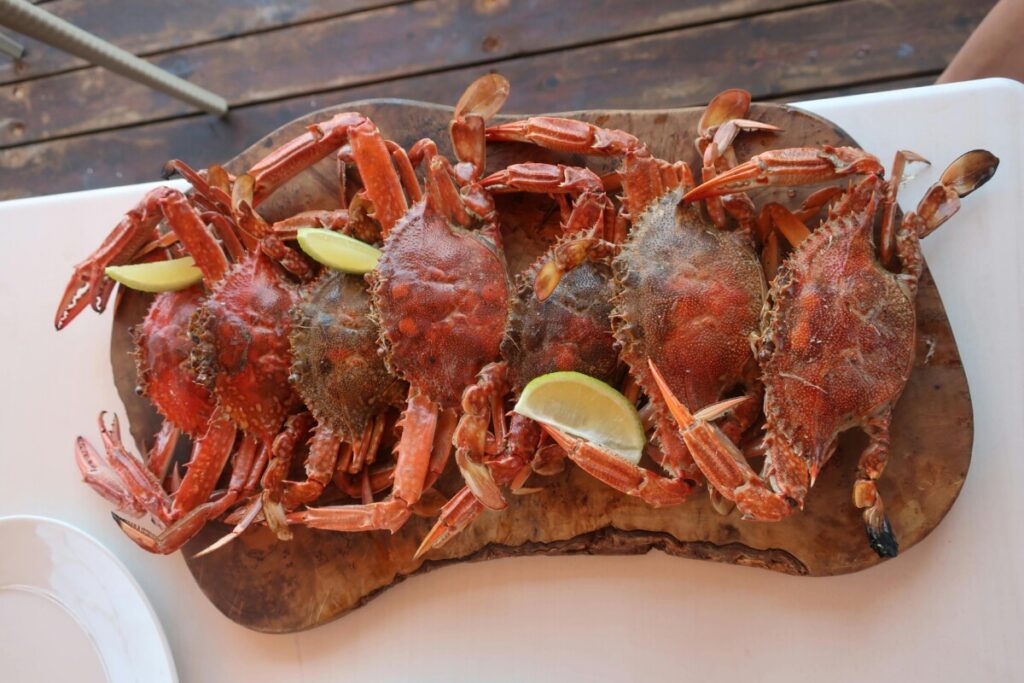Health Benefits of Eating Crabs

When it comes to seafood, crabs are often overlooked in favor of more popular options like shrimp or salmon. However, incorporating crab meat into your diet can offer a wide range of health benefits. From being a rich source of essential vitamins and minerals to boosting your immune system and supporting bone health, crabs have a lot to offer in terms of nutrition. Additionally, crab meat is low in calories and fat, making it a great option for those looking to maintain or lose weight. In this post, we’ll explore the top reasons why eating crabs is good for your health and how to incorporate this delicious seafood into your diet.
The Nutritional Benefits of Eating Crabs
Eating crabs can provide many important nutrients and health benefits:
Crabs are a great source of essential vitamins and minerals such as Vitamin B12, Zinc, and Selenium.
Eating crabs can help improve brain function due to the high levels of Omega-3 fatty acids.
Crabs are also a good source of protein and have little to no carbs, making them a great option for those on a low-carb diet.
Yes, that’s right! Crabs are indeed safe to eat because they have low levels of mercury and toxins. Enjoy your meal!
Crabs are rich in antioxidants which can help protect cells from damage and reduce the risk of chronic diseases.
Overall, incorporating crab into your diet can improve your nutrition and provide many health benefits.
Crabs: A Great Source of Lean Protein
Crab meat is an excellent source of protein, with one serving of crab meat (100g) containing about 20g of protein. This makes crab meat a great option for those looking to increase their protein intake to support muscle growth and repair.
In addition to being high in protein, crab meat is also low in saturated fats, making it a healthier protein source than red meat. Eating crab meat can also help you feel fuller for longer, reducing the temptation to snack on unhealthy foods between meals.
Crab meat is also lower in calories than other protein sources such as beef or pork, making it a great option for those looking to control their caloric intake. And because it is easily digestible, crab meat is a great source of protein for those with digestive issues or sensitivity to other protein sources.
Incorporating crab meat into your diet can help you achieve your fitness goals while maintaining a healthy diet. So the next time you’re looking for a protein source, consider adding some delicious crab meat to your plate!
How Eating Crabs Can Boost Your Immune System
Crabs can be a great addition to your diet if you’re looking to boost your immune system.
Here are some ways that crab meat can help:
High levels of nutrients
Crabs are high in nutrients such as Zinc, Selenium, and Vitamin C, which are important for supporting a healthy immune system. These nutrients can help improve the function of immune cells and reduce the risk of infections and illnesses.
Reduced inflammation
Eating crab meat can help reduce inflammation in the body. Chronic inflammation can weaken the immune system, so reducing inflammation can help improve overall immune function.
Antioxidants
Crabs are also high in antioxidants, which can help reduce cellular damage and improve immune cell function. This can help reduce the risk of chronic diseases and support overall health.
Omega-3 fatty acids
Omega-3 fatty acids found in crabs can also help boost immune function. These healthy fats can help regulate the immune system and reduce inflammation.
By eating crab meat as part of a balanced diet, you can support your immune system and reduce the risk of illness and disease.
The low-calorie and low-fat content of Crabs
Aside from their nutritional benefits, crabs are also a great option for those looking to maintain a healthy weight and reduce the risk of chronic diseases.
Here’s why:
Crab meat is low in calories, making it a great option for those looking to maintain or lose weight.
Not only is crab meat low in fat, but it is also a much healthier protein option compared to various other types of meat.
Crab meat is low in carbs, making it a great option for those on a low-carb or keto diet.
Crab meat contains no trans fats, which are harmful to heart health.
Choosing low-calorie and low-fat options like crab meat can help reduce the risk of chronic diseases such as heart disease and diabetes. Incorporating crab meat into a balanced diet can also help you achieve a healthy weight and reduce the risk of obesity-related diseases. So next time you’re looking for a healthy protein source, reach for some delicious and nutritious crab meat!
Why Eating Crabs Can Help Improve Your Heart Health

Crab meat is a healthy protein source that can support heart health in several ways. Crab meat presents an excellent choice for individuals seeking a healthy and low-saturated fat food option that can potentially contribute to decreasing the likelihood of heart disease. Yes, crab meat does contain Omega-3 fatty acids, which have been recognized for their anti-inflammatory properties and potential benefits for cardiovascular health.
Eating crab meat can help lower LDL (bad) cholesterol levels, which can reduce the risk of heart disease. Crab meat contains important nutrients such as potassium and magnesium, which are important for maintaining healthy blood pressure levels. Including crab meat in a balanced diet can help support heart health and reduce the risk of heart disease and stroke.
The Importance of Incorporating Crabs into Your Balanced Diet
Including a variety of seafood, including crab meat, in your diet can improve overall nutrition and reduce the risk of chronic diseases. Crab meat is a great source of lean protein, which is important for maintaining muscle mass and supporting other body functions.
Crab meat contains important nutrients such as Omega-3 fatty acids and Vitamin B12, which are essential for overall health and well-being. These nutrients are known to support heart health, brain function, and immune system function.
Incorporating crab meat into your diet can also help you achieve a balanced and varied diet. Crab meat contains important vitamins and minerals such as Zinc, which is important for wound healing and immune function.
Eating crab meat can help you maintain a healthy weight and reduce the risk of obesity-related diseases. Crab meat is low in calories and fat, making it a healthier protein source than many other types of meat.
Overall, adding crab meat to your diet can help you achieve optimal health and well-being.
The Vital Nutrients Found in Crabs and Their Health Benefits
Crabs are a great source of essential nutrients that can provide numerous health benefits:
Protein
Crab meat is a good source of protein, which is important for building and repairing tissues in the body. Protein also serves as a primary source of energy and can help reduce feelings of hunger and promote satiety.
Omega-3 Fatty Acids
Crabs contain high levels of Omega-3 fatty acids, which are important for brain function and can reduce inflammation in the body. Omega-3 fatty acids can also help lower the risk of heart disease and improve overall cardiovascular health.
Vitamin B12
Crabs are rich in Vitamin B12, which is important for healthy nerve function and the production of red blood cells. Vitamin B12 can also help improve energy levels and reduce fatigue.
Zinc
Zinc is a crucial mineral present in crabs that plays a vital role in supporting immune function, promoting efficient wound healing, and ensuring healthy growth and development. Furthermore, zinc serves as a shield against age-related macular degeneration, while effectively reducing the risk of infections.
Selenium
Crabs are a good source of Selenium, an antioxidant that can help reduce inflammation, protect against cellular damage, and lower the risk of certain types of cancer.
These vital nutrients found in crabs make them healthy and nutritious food that can support overall health and well-being.
Ways to Cook and Enjoy Crabs to Maximize Their Nutritional Value

When it comes to cooking and enjoying crabs, there are many ways to do so while still maximizing their nutritional value. Here are a few tips:
1. Steaming or Boiling:
Steaming or boiling crab meat is a great way to preserve its nutritional value and avoid adding extra fats or calories. Simply fill a large pot with water, add some seasoning, and bring to a boil. Once the water is boiling, add the crabs and let them cook for about 8-10 minutes. Remove from heat and serve hot with some side salad or healthy vegetables.
2. Pair with Nutrient-rich Vegetables:
Pairing crab meat with fresh, nutrient-rich vegetables and herbs can help maximize its health benefits. Some good options include zucchini, asparagus, spinach, kale, bell peppers, and tomatoes. Simply sauté or roast these vegetables in a healthy oil and season with herbs and spices for a delicious and healthy meal.
3. Avoid Deep-frying or Breading:
Avoid deep-fried or breaded crab meat, as this can add extra calories and unhealthy fats. Instead, try baking or broiling crab meat with a simple seasoning such as lemon, garlic, and black pepper, or try dredging the crab meat with whole wheat crumbs and baking until crispy with some olive oil.
4. Incorporate into Salads or Healthy Dishes:
Try incorporating crab meat into salads or other healthy dishes, rather than using it as a main course with heavy sides. Crab meat pairs well with mixed greens, avocado, cucumber, and cherry tomatoes. You can also use crab meat in healthy wraps, sushi rolls, or burrito bowls.
5. Experiment with Different Spices and Seasonings:
Experiment with different spice blends and seasonings to add flavor to your crab meat dishes without adding excess salt or sugar. Cajun seasoning, Old Bay seasoning, or some fresh herbs such as basil, cilantro, or parsley are all great options to try.
By incorporating these tips into your cooking routine, you can enjoy the delicious taste of crab while still reaping its numerous health benefits.
Conclusion
In conclusion, incorporating crabs into your diet can offer a wide range of health benefits that can improve your overall well-being. From providing essential nutrients to supporting bone and heart health, crabs are a great addition to any balanced diet. Not only are they low in calories and fat, but they’re also a good source of lean protein, making them a great option for weight management and muscle growth. With so many ways to cook and enjoy crab meat, it’s easy to incorporate this delicious and nutritious seafood into your meals. So next time you’re at the grocery store or seafood market, consider picking up some fresh crabs to add to your next meal. Your body will thank you for it!
https://holisticwellnesswave.com/index.php/2024/04/12/the-health-benefits-of-asparagus/
https://www.dc-steakhouse.com/
FAQs
Q: What are the health benefits of eating crab?
A: Eating crab provides several health benefits such as being a good source of high-quality protein, omega-3 fatty acids, and various nutrients that play vital roles in your health and development.
Q: How does crab meat contribute to brain health?
A: Consuming crab, especially the omega-3 fatty acids found in crab meat, can contribute to brain health and help reduce the risk of strokes and heart attacks.
Q: Is crab a low-calorie seafood option?
A: Yes, crab is low in calories, making it a delicious and healthy seafood choice for those looking to maintain a balanced diet.
Q: What makes crab a good source of protein?
A: Crab meat is a good source of high-quality protein, with approximately XX grams of protein per 100 grams of crab.
Q: What nutritional and health benefits does crab offer?
A: Crab provides various health benefits such as being rich in omega-3s, helping fight free radicals, and reducing the risk of strokes and heart attacks.
Q: How can I incorporate crab into my diet?
A: You can enjoy crab in dishes like crab cakes, crab legs, or simply by adding crab meat to salads or pasta for a delicious and nutritious meal.
Q: Is crab meat a good addition to promote heart health?
A: Yes, regular consumption of crab meat, which contains omega-3 fatty acids, can help reduce the risk of heart attacks and promote overall heart health.








